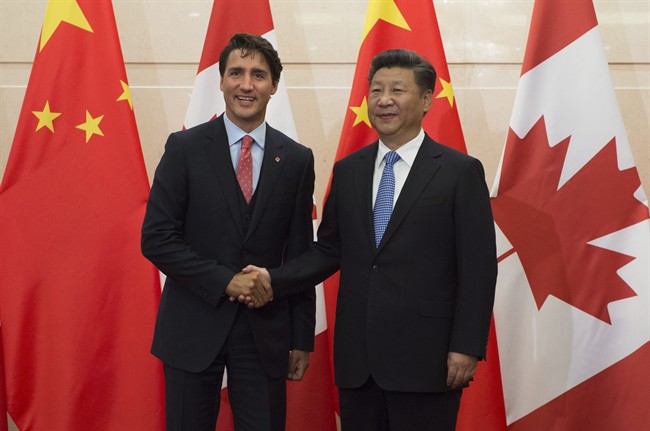Should Canada consider a free trade deal with China? As Prime Minister Justin Trudeau mulls a possible trade mission to the country next month, the answer ought to be a resounding “No” — not because such a deal would damage our economy or our trading relationship with the U.S., but rather because it threatens something even more precious: our democracy.

China is an authoritarian dictatorship. Its human rights record is abysmal. Thousands of people are executed there every year for crimes against the state. People who run afoul of the authorities routinely disappear.
China has no free press. The country ranks worst in the world for internet freedom, routinely censoring its citizens and monitoring their communications. Beijing is even working on a facial recognition system that reportedly will be able to track every one of its 1.3 billion people, via a network of cameras that will be able to ID faces within three seconds, with an accuracy level of 88 per cent or greater.
The greater problem with China, however, is that its authoritarian attitudes don’t stop at its borders.
It is notorious for pressuring members of the Chinese diaspora overseas to promote its agenda through a so-called “united front” effort. The United Front Work Department is an arm of the Chinese Communist party which pushes for global “soft power,” now one of the top priorities of President Xi Jinping’s government. United Front does so by burnishing the image of China overseas — funding development projects, endowing universities, even perhaps helping to overthrow a government now and then (looking at you, Zimbabwe).
- Canadian man dies during Texas Ironman event. His widow wants answers as to why
- On the ‘frontline’: Toronto-area residents hiring security firms to fight auto theft
- Honda’s $15B Ontario EV plant marks ‘historic day,’ Trudeau says
- Canadians more likely to eat food past best-before date. What are the risks?
China’s leadership isn’t even hiding its expansionist plans anymore.
In October, Xi used the 19th National Congress of the Communist Party of China to amend the party’s constitution to create a “guide to action for the entire Party and all the Chinese people to strive for the great rejuvenation of the Chinese race.” Ethnicity, not nationality, is deemed to be the unifying element: Premier Li Keqiang said earlier this year that “the Chinese race is a big family and feelings of love for the motherland, passion for the homeland, are infused in the blood of every single person with Chinese ancestry.”
Author Clive Hamilton, a professor at Charles Sturt University in Australia, recently chronicled Chinese efforts to exploit its diaspora in Australia by funding education systems and pushing Chinese-language media to sing the praises of Beijing. Hamilton’s book was spiked by its publisher because it was worried about “potential threats to the book and the company from possible action by Beijing.” The publisher, Allen & Unwin, cited “Beijing’s agents of influence” and said printing the book would raise “the very high chance of a vexatious defamation action against Allen & Unwin, and possibly against you personally as well.”
Even here in Canada, the regime targets so-called “ethnic” Chinese individuals. Denzil Minnan-Wong, a Toronto-area city councillor and Canadian-born son of a Chinese immigrant father, acknowledged to the Globe and Mail that he had been exposed to Chinese pressure over a trip he had planned to Taiwan. “I have travelled to Taiwan before. And the Chinese government has expressed concern to me that they’re not pleased,” Minnan-Wong said (he took the trip anyway).
So why, fresh after denouncing human rights violations in the Philippines, would Trudeau blithely ignore the state of affairs in China and contemplate a free trade deal with Beijing?
In the past, Canada has denounced race-based societies such as 1980s South Africa, whose apartheid system Canada helped bring down by encouraging sanctions and boycotts by major trading partners. The Progressive Conservative government of Brian Mulroney did not seek out trading opportunities with this oppressive regime; it sought to free the people there instead.
WATCH BELOW:
Of course, our current prime minister is the one who, when asked in 2013 which country’s administration he most admired, famously spoke of his “level of admiration … for China because their basic dictatorship is allowing them to actually turn their economy around on a dime and say, ‘We need to go green … we need to start investing in solar.’” Trudeau’s remarks seemed naïve then. In the current context, they’re downright scary.
Yes, free trade with China would help Canadian businesses exploit a market of 1.3 billion people. But those people are already being exploited, by their own government. A free trade deal with China should not be on the table until and unless the Chinese government changes its authoritarian and expansionist tune.
That may never happen. But then neither should a deal that could compromise our sovereignty.
Tasha Kheiriddin can be heard between noon and 2 p.m. ET on Toronto Talk Radio AM640. She’s also a columnist with Global News and iPolitics.ca, where this piece first appeared.













Comments